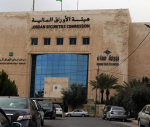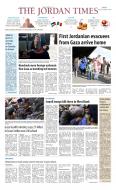You are here
Israeli economy grapples with uncertainty amidst escalation of Gaza conflict
Oct 09,2023 - Last updated at Oct 09,2023
The Israeli economy finds itself on an unpredictable trajectory as military confrontations intensify with Palestinian resistance factions in Gaza under Operation “Al Aqsa Flood”, initiated by the Al Qassam Brigades, the armed arm of the Hamas movement.
This escalation comes at a precarious juncture for the Israeli market, awaiting crucial decisions regarding interest rates by the Bank of Israel. Simultaneously, the Israeli shekel's continuous decline against the US dollar and other foreign currencies, coupled with a five-day consecutive downturn in the Tel Aviv Stock Exchange, deepens the economic uncertainties.
The Israeli economy, which primarily relies on advanced technology and manufacturing, is anticipated to bear the brunt of this increased instability, experts suggest. The "Al Aqsa Flood" operation is expected to have immediate economic impacts, possibly leading to the closure of the stock market to mitigate potential financial repercussions.
The ongoing conflict has already disrupted daily business activities. Many shops and services, which usually operate on Saturdays, remained closed as the war unfolded. Business owners cited difficulties in maintaining routine activities amid the turmoil, with some expressing uncertainty about their continued operation. Tourism, a significant contributor to Israel's economy, has taken a hit, with numerous hotel cancellations and airlines cancelling flights to Tel Aviv. These disruptions coincide with calls to suspend classes and the closure of hundreds of industrial zones and thousands of commercial establishments, impacting the livelihoods of millions.
Past conflicts have demonstrated a considerable financial toll on Israel. The costs associated with combat, compensation and indirect expenses from business closures and tourism losses can accumulate into billions of shekels. The economic impact of the current conflict is uncertain but is expected to be substantial. Economic experts anticipate further depreciation of the shekel against the dollar and continued stock market declines if the conflict persists. The overall impact on the Israeli economy may lead to a deeper budget deficit and further challenges in the post-war recovery process.
While the economic consequences of the "Al-Aqsa Flood" operation are yet to be fully understood, it is clear that southern Israel, and possibly Tel Aviv, will experience significant disruptions. The economic landscape will depend on the duration and intensity of the conflict, and the Israeli government may take measures such as closing the stock market to stabilise the situation. The impact could extend beyond Israel, affecting the air and sea transport sector, vital for tourism and trade. Attacks on infrastructure, including the gas sector, may further complicate the economic aftermath.
The Israeli economy is already grappling with challenges stemming from recent legislative changes and reduced foreign investments. The situation is exacerbated by the ongoing conflict, which threatens to undermine economic stability and growth. The recurring cycle of violence between Israel and Gaza has left an indelible mark not only on the region's political landscape but also on its economic well-being. The recent "Al Aqsa Flood" operation is no exception, and its economic repercussions are poised to resonate for years to come.
Historically, military conflicts in the region have taken a substantial economic toll. The Second Lebanon War in 2006 led to a GDP loss of 0.5 per cent to 0.35 per cent, according to estimates by the Bank of Israel. Operation Protective Edge in 2014, the most significant round of fighting in Gaza since the disengagement, incurred a loss of about 0.3 per cent of that year's production and an estimated cost of the New Israeli Shekel (NIS) 3.5 billion. One of the most significant impacts has been felt within the tourism industry. The Bank of Israel reported losses of approximately 2 billion shekels, as tourists shied away from visiting conflict-ridden areas. These losses, both direct and indirect, were staggering.
The current conflict in Gaza has ignited concerns about the Israeli economy's resilience. It is expected that this war could deepen existing economic crises, further eroding the value of the shekel against the dollar and impacting the Israeli stock exchange. The possibility of closing the stock market, as seen in previous conflicts, looms large. The economic turbulence is not confined to southern Israel. Tel Aviv, the country's economic hub, is also at risk due to missile strikes from Palestinian resistance groups. The anticipated disruptions have led to expectations of a rising dollar against the shekel when trading resumes.
Military tensions cast shadows over the financial market, air and sea transport sectors, and even the Israeli gas sector if infrastructure is targeted. These disruptions extend to tourism, which relies heavily on security stability. The Israeli economy has been grappling with challenges beyond the conflict, such as legislative changes and reduced foreign investments. The passing of laws limiting the powers of the supreme court raised concerns among investors, resulting in a significant decline in foreign investments in the first quarter of 2023.
As the conflict rages on, the Organisation for Economic Cooperation and Development projects a slowdown in Israel's economy, with expected growth rates dropping from initial estimates. The economic consequences of the "Al Aqsa Flood" operation, while difficult to quantify at this stage, are undoubtedly significant. The cost of ongoing conflicts in the region extends far beyond the immediate humanitarian toll. It inflicts deep wounds on the economies of the nations involved, and Israel is no exception. As the fighting persists, the true economic toll will only become clearer, underscoring the urgent need for lasting peace and stability in the region.
As Israel faces an uncertain economic future amidst heightened military tensions, the full extent of the economic consequences remains uncertain. However, it is evident that the economic fallout from Operation “Al Aqsa Flood” will be significant and will require careful navigation and recovery efforts in the months ahead.
- Popular
- Rated
- Commented
Nov 03, 2023
Nov 03, 2023
Oct 31, 2023
Nov 03, 2023
Newsletter
Get top stories and blog posts emailed to you each day.











